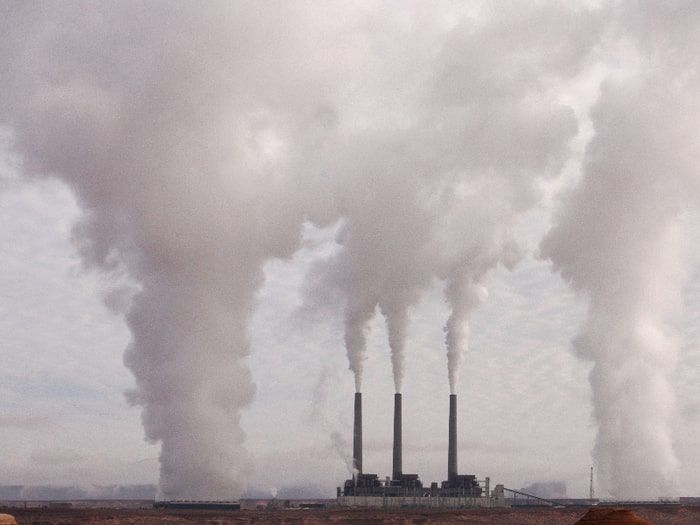Mexico, one of the 13 largest CO2 emitters in the world
Mexico emitted 737 million tons of carbon dioxide (CO2) in 2019, the main cause of global warming, which places it as one of the 13 largest emitting countries in the world, according to the update of the National Inventory of Emissions of Greenhouse Gases and Compounds.

In 2019 Mexico emitted 737 million tons of carbon dioxide (CO2), the main cause of global warming, which places it as one of the 13 largest emitting countries in the world, according to the update of the National Inventory of Emissions of Greenhouse Gases and Compounds (Inegycei).
In presenting the results of the study, the National Institute of Ecology and Climate Change (INECC) pointed out that between 1990 and 2019, greenhouse gas emissions grew 62 percent. The energy sector is the main generator of CO2, followed by auto transport and livestock.
"The Inventory shows that 64 percent of emissions in our country come from energy use in all sectors; 19 percent from agriculture, forestry, and other land uses, mainly livestock; 10 percent from other industrial processes and product use; and 7 percent to waste management," said María Luisa Albores González, head of the Ministry of Environment and Natural Resources (Semarnat).
Waste disposal sites are the fourth and fifth largest source of GHG emissions and contribute 4 percent.
Fabiola Ramírez Hernández, director of Inventories and Forecasts of Greenhouse Gas and Compound Emissions at INEEC, pointed out that the increase in GHG emissions in industry and livestock in agriculture "is because we have an increase in the products of economic activities".
He detailed that Mexico's ecosystems, mainly forests, absorbed 202 million tons of (CO2), which means that our country registered net emissions of 535 million tons of carbon dioxide.
Mexico ranked first in CO2 emissions in Latin America
Mexico is the leader in carbon dioxide (CO2) emissions in Latin America, an unenviable position it has consolidated over the past 20 years and, according to specialists, has not done enough to reverse it. This situation is aggravated, the experts said, by the energy policy of the government of President Andrés Manuel López Obrador, which prioritizes fossil fuels over renewable energy generation.
According to data from the Global Carbon Atlas, a project of the international network of scientists Future Earth and the UN, Mexico registered 477 megatons of carbon dioxide (MtCO2), making it the Latin American country that emitted the most in 2018, according to the most recent data, ahead of Brazil. Mexico ranks 12th in the world, led by China with 10,065 MtCO2, followed by the United States with 5,416 MtCO2 of the main greenhouse gas responsible for global warming.
"Mexico must leave behind the state-owned Pemex and oil and focus on having a 'SOLAR-MEX', said in an interview with Efe, Jorge Martinez, from the organization Citizens for a Living Climate. "This is really a key point because Mexico has enormous solar potential to exploit and that is the future," said the activist, influenced by Jeffrey Sachs, father of the Sustainable Development Goals.
Martínez recalled that during the COP25 in Madrid in December, they met with Sachs and he offered them that point of view. The activist said that the energy policy of the current Mexican government "unfortunately is based on an ideology, which has expired (of privileging fossil fuels) and not on the reality that is lived in the world.
These decisions mean that Mexico is going in the opposite direction by "betting everything on the past in terms of energy," warned Martínez, one of the winners of the Green Ticket for the first Youth Climate Summit in September 2019. He also regretted that the National Development Plan of the López Obrador Administration (NDP 2019-2024) does not mention climate change or greenhouse gas emissions.
Insufficient actions
The Mexican government's actions are "insufficient" to reduce its greenhouse gas emissions, according to the latest report by the Climate Action Tracker platform, Climate Analytics, and the New Climate Institute, launched in December 2019. The assessment condemns, among other actions, the construction of a new oil refinery (in Dos Bocas, in the southeastern state of Tabasco) and a new budget allocation for "modernization" of coal, diesel, gas, and oil power plants.
He also noted that the López Obrador administration has not yet developed or announced the third Special Program on Climate Change (PECC 2019-2024) required under Article 66 of Mexico's General Law on Climate Change. "This indicates that Mexico does not have an action plan for climate change in the short term, making it even less likely to achieve its international climate goals," said the analysis published on the Climate Action Tracker website.
International commitments at risk
In the Paris Agreement, which enters into force this year, Mexico committed itself in 2015 to take action against climate change by 2050, Emily Medina, an energy sector specialist, told Efe. She recalled that under the last administration, led by President Enrique Peña Nieto (2012-2018), Mexico signed the Paris Agreement and its goal was to achieve 35 percent clean energy production.
"In other words, it would expand the share of renewable energy sources in electricity generation to 35 percent by 2024, and would increase to 37 percent in 2030 and 50 percent by 2050," Medina said. "We were on track to achieve these objectives because the Energy Reform (2013) was made, which precisely opened the sector to private participation," said the specialist, an associate of the Think Tank "Energy Policy Research Foundation", in Washington D.C.
However, she said that the current Mexican government "is against the aforementioned reform and has dedicated itself to dismantling it", in a political speech that goes against what the Peña Nieto government carried out. The current administration "decided to cancel long-term auctions in the electricity sector, which has slowed down the progress of the energy transition".
Medina also described as serious that the government is in the process of granting Clean Energy Certificates (CELs) to hydropower projects when these were created to certify renewable energy projects. "This modification breaks the market," said the expert, because "instead of having renewable energy projects, solar and wind energy, they are now allowing hydroelectric power, old plants, to count as a new solar power plant.
Mexico has much to do to comply with international commitments and achieve the necessary reductions in CO2, especially in the transport, electricity generation, industry, and livestock sectors agreed the experts. In February, the Mexican government will have to announce a new energy plan, however, "its vision for private participation is quite closed," said Medina, so do not expect much progress.




